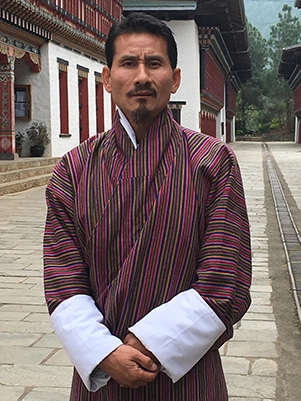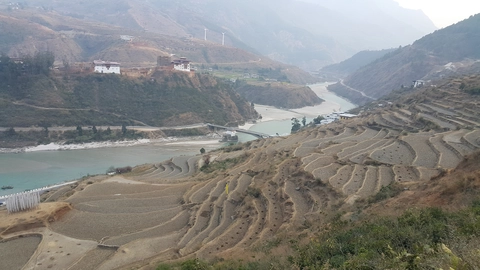Reality check on a happy country: Academic life in Bhutan
May 20, 2020.
Sonam Tashi is an agricultural scientist and ZEF-alumnus from Bhutan. The interview was conducted by Andreas Haller via E-Mail.
After obtaining your doctoral degree from the University of Bonn in 2014, you returned to Bhutan to become an Associate Professor at the Royal University. What topics and research projects have you been you working on?
I teach modules related to Medicinal and Aromatic Plants and Organic Agriculture. It is a full-time teaching job! There are about 40 students in each class. The research projects I run are also in these fields. However, the setting up and running of major research projects is constrained by limited research funds and a lack of time. Full-time teaching, supervision of students’ projects and their theses in addition to other daily academic chores consumes a huge amount of time. This is a bit unfortunate, as there are so many potentially interesting fields of research in Bhutan that have yet to be explored.
Do you think developing countries should focus more on research to be able to face the world’s future challenges?
All faculty members have to do the following: teaching - 60%; research - 30%; and community service - 10%. Research is very important, but so is education and teaching. Of course, research forms the basis of teaching and is our top priority. However, the reality on the ground is that we do not have adequate manpower to handle both teaching and research. So teaching consumes most of our daily resources. Research may catch up in the coming years, say, maybe five, seven or so years from now.
You were at ZEF in Bonn for four years. What do you consider the benefits of your education at ZEF?
My time at ZEF strengthened my research skills and also exposed me to various development concepts and approaches. Looking back, I nostalgically recall how ZEF conducted several events related to academia, including workshops on leadership, food security, research ethics language classes, and intercultural skills. These and other events have helped my academic development. At ZEF I also got the opportunity to interact and network with many eminent academics and scholars from a wide academic and scientific spectrum. A strong work and research culture, and the transdisciplinary nature of the academic courses and research at ZEF continue to make a difference in my professional life. I will always fondly cherish my time at ZEF and feel profoundly blessed that I had the opportunity to study at ZEF. I would like to sincerely thank everyone there.
You conducted your doctoral research at ZEF about organic agriculture in Bhutan (see interview in ZEFnews No. 30). Back in 2014 Bhutan’s agriculture was projected to be 100% organic by 2020. What is the situation in Bhutan at the moment? What are the challenges for sustainability?
True, Bhutan has set an ambitious goal to fully convert the country to organic agriculture. However we will miss the 2020 deadline for various reasons. Our farms are small, scattered and situated on slopes and terrains. Hence, accessibility has been and continues to be a major constraint. Labor shortage, human-wildlife conflict and farm inputs are other critical challenges hampering agriculture development in general. Nevertheless, Bhutan is determined to go fully organic one day, even if not by 2020. To this effect, the Royal Government of Bhutan launched a five-year organic flagship program just last July. Around the same time, my College also started a four-year formal BSc degree in Organic Agriculture. We are a kind of a pioneer in this given that there is hardly a university across the world which offers a BSc degree in Organic Agriculture.
Bhutan measures its development not merely in economic terms, but instead famously focuses on “Gross National Happiness”. How does this pursuit of happiness relate to your work as a scientist, specifically in regard to the issue of organic agriculture? And on a broader scope: What does it mean to set happiness as a development goal?
Both the organic agriculture and Gross National Happiness philosophies share many commonalities. They ultimately aspire to achieve long-term sustainability through the conservation of ecosystems upon which the health and well-being of all lives on the planet depend. By adopting organic agriculture, Bhutan is also promoting Gross National Happiness. We look at Gross National Happiness as development with values, and, similarly, organic agriculture as farming with values. The relevance of value is becoming even more significant in the 21st century in a world full of mindless consumerism, which is groaning under the stress of a capitalist economy. Our value system is not captured by a development model measured only through Gross Domestic Product indicators. Measuring growth or development through the indicators of Gross Domestic Product, as practiced elsewhere, misses out on so many important facets of life and living such as family, relationships, health, the natural environment and so on. True growth should bring happiness, well-being and balance. The Gross National Happiness development model seeks to do exactly that through its four pillars, namely Conservation of the environment, Good governance, Equitable and sustainable development, and Preservation of culture. All new projects in Bhutan have to go through a Gross National Happiness screening tool to ensure that the plans do not contradict the Gross National Happiness values. If we consider health as wealth then the Gross National Happiness model helps to measure the true wealth of a country.
All over the world young people are demonstrating against climate change. What is the perspective of students and young academics in Bhutan on sustainable development? Are there demonstrations too?
We don’t have demonstrations in Bhutan, peaceful or otherwise. My College offers a three-year Bachelor’s degree in Environment and Climate Studies and a three-year Bachelor’s degree in Sustainable Development. Our students conduct and participate in various climate-related events such as exhibitions, debates and skits both on and off the campus. Students also do academic projects on climate change adaptation and mitigation, causes of climate change, impact assessment, Sustainable Development Goals and so on. I feel that our students are becoming more aware of and concerned about climate change and the need to adopt practices such as “sustainable behavior” that can ensure long-term sustainability. In our College, we continue to reinforce ideas on sustainable living through mindful and value-based education. We have student clubs such as The Earth Guardians, which consistently conduct activities on things that we can do to protect and promote the health of our ecosystem and planet.
This article is from ZEFnews 40. For the full issue see:
https://www.zef.de/fileadmin/user_upload/ZEFnews_no40.pdf



